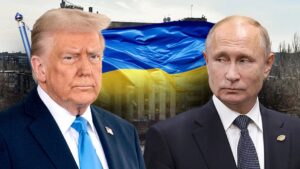The EU must open its own talks with Russia rather than rely on Washington, France’s president, Emmanuel Macron, has said as he warned of the prospect of the “most tragic thing of all – war”.
In a wide-ranging speech in Strasbourg, Macron said it was not sufficient for the US to negotiate with the Kremlin over its threats to peace but that Europe needed to have its voice heard.
Macron said he hoped to revitalise four-way talks between Russia, Germany, France and Ukraine, known as the Normandy format, to find a solution to the escalating crisis.
The French president, who was speaking to mark the start of his country’s six-month presidency of the EU, told MEPs: “I think our credibility vis-a-vis Russia lies primarily in entering into demanding dialogue.
“And we see that looking at the dialogue that the US and Russia are currently undertaking. I think that it is good for there to be coordination between Europe and the US but it is vital that Europe has its own dialogue with Russia.”
Officials in Brussels insist that Russia has not been able to divide the west in recent months as it has amassed more than 100,000 troops on its border with Ukraine.
But for all the protests of a unified approach, the EU was sidelined from talks held last week between Russia and the US, Nato and the Organization for Security and Co-operation in Europe.
The Normandy format is a legacy of a meeting of the leaders of Germany, France, Ukraine and Russia during the 2014 D-day celebrations.
It subsequently became a vehicle for implementation of the 2015 Minsk agreements designed to end the separatist war in Ukraine’s Donbas region that followed Russia’s 2014 annexation of Crimea.
Macron said, however, that the EU had to work out a coordinated approach in its future talks with Russia and address its vulnerabilities with regard to the Kremlin, including energy supply.
The EU has threatened severe economic and diplomatic consequences should there be a further military incursion. But the 27 member states are divided as to what should trigger sanctions, with some arguing that cyber-attacks or false-flag operations should be dealt with in the same way as a full-on occupation.
Macron said: “We’ve seen migration movements being manipulated. We’ve seen cyber-attacks. We’ve seen hikes in gas prices. And on this front we need to build in collective resilience together.
“The security of our continent requires strategic rethinking, strategic rearming of Europe as an area of balance and peace. And when it comes to dialogue with Russia in particular.
“This dialogue is something I’ve been standing up for for many years. It’s not just a vague idea … We need this dialogue we need in Europe collectively to set out our own requirements and make certain that they are respected, and we need to be in a position to make that happen.”
Beyond the escalating security threat to the east, Macron touched on a range of EU priorities for the French government, including strengthening the rule of law within the bloc, reducing the gender wage gap and giving rights to people who are commissioned with piecemeal work through web platforms. He also proposed including the right to abortion in the European Charter of Fundamental Rights.
Citing the issues of Northern Ireland and fishing rights in UK waters, he warned the British government that in order to “remain friends” it “needs to commit to itself in good faith respecting the agreements already concluded with the union”.
Macron told critical MEPs that he would not use the EU presidency as a “springboard” for his reelection as French president in three months’ time. However, he challenged those who equated his belief in stronger powers at an EU level with a lack of patriotism.
He said: “I will distinguish between those that love their country and culture … and those that want to destroy Europe. I think actually there is a majority here, for example, who believe in Europe but also the cultures and identities of each country but still fight against the barbaric acts of nationalism.”
Ahead of the first round of the French presidential election in April, Macron’s political opponents, including on the European parliament benches, sought to use his appearance to criticise his record.
Yannick Jadot, the Green MEP and presidential candidate, told Macron he had “sacrificed” Europe’s ambitions on the climate crisis. “You will go down in history as the president of climate inaction.”
Jordan Bardella, an MEP from Marine Le Pen’s far-right National Rally, told the parliament that European immigration policy meant member states and their people could no longer decide “who enters or leaves their territory” so Europe risked “no longer being Europe”.
Meanwhile, the far-right TV pundit and presidential challenger ?ric Zemmour headed to Calais in northern France to deliver a speech on the site of a former makeshift camp where thousands of migrants had once slept rough as they hoped to stow away on lorries to reach England.
He said France should immediately deport any migrant entering its territory who hoped to reach the UK. He said that, because of immigration, Macron’s idea of Europe was “a Europe without mind, body or soul, pulling up its own roots, erasing its own history”.





